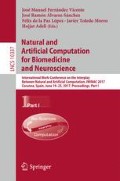Abstract
This work proposes a new method to model the extrinsic motivation of a cognitive architecture based on the discovery of separable utility regions (SUR), which reduce the complexity of the standard value functions typically used. Those regions exhibit a correlation between the expected utility and the response of one sensor of the robot. Once they are discovered, the evaluation of the candidate states is only based on the changes of one sensor, which provides a strong independence from noise or dynamism in the utility models. A non-static variation of the classical collect-a-ball scenario was used to test the mechanism in order to generate and define the certainty maps associated to those SURs. Preliminary results show a good response of the technique and a clear improvement in performance when this is associated to a restructuring mechanism for the utility model, which, in this case, corresponds to the creation and chaining of sub-goals.
Access this chapter
Tax calculation will be finalised at checkout
Purchases are for personal use only
References
Cangelosi, A., Schlesinger, M.: Developmental Robotics: From Babies to Robots. MIT Press, Cambridge (2015)
Ryan, R., Deci, E.: Intrinsic and extrinsic motivations: classic definitions and new directions. Contemp. Educ. Psychol. 25, 54–67 (2000)
Baldassarre, G., Mirolli, M.: Intrinsically motivated learning systems: an overview. In: Baldassarre, G., Mirolli, M. (eds.) Intrinsically Motivated Learning in Natural and Artificial Systems, pp. 1–14. Springer, Heidelberg (2013)
Singh, S., Lewis, R.L., Barto, A.G., Sorg, J.: Intrinsically motivated reinforcement learning: an evolutionary perspective. IEEE Trans. Auton. Mental Dev. 2(2), 70–82 (2010)
Oudeyer, P.Y., Kaplan, F., Hafner, V.V.: Intrinsic motivation systems for autonomous mental development. IEEE Trans. Evol. Comput. 11(2), 265–286 (2007)
Di Nocera, D., Finzi, A., Rossi, S., Staffa, M.: The role of intrinsic motivations in attention allocation and shifting. Front. Psychol. 5, 273 (2014)
Bellas, F., Duro, R.J., Faia, A., Souto, D.: MDB: artificial evolution in a cognitive architecture for real robots. IEEE Trans. Auton. Mental Dev. 2, 340–354 (2010)
Nguyen, S.M., Baranes, A., Oudeyer, P.Y.: Bootstrapping intrinsically motivated learning with human demonstration. In: Proceedings of ICDL 2011, pp. 1–8 (2011)
Huang, X., Weng, J.: Inherent value systems for autonomous mental development. Int. J. Humanoid Robot. 4, 407–433 (2007)
Salgado, R., Prieto, A., Bellas, F., Duro, R.J.: Improving extrinsically motivated developmental robots through intrinsic motivations. In: Proceedings of ICDL 2016 (2016)
Salgado, R., Prieto, A., Bellas, F., Calvo-Varela, L., Duro, R.J.: Motivational engine with autonomous sub-goal identification for the Multilevel Darwinist Brain. Biologically Inspired Cogn. Architectures 17, 1–11 (2016)
Ollion, C., Doncieux, S.: Why and how to measure exploration in behavioral space. In: Proceedings of GECCO 2011, pp. 267–294 (2011)
Acknowledgments
This work has been partially funded by the EU’s H2020 research and innovation programme under grant agreement No. 640891 (DREAM project) and by the Xunta de Galicia and redTEIC network (ED341D R2016/012).
Author information
Authors and Affiliations
Corresponding author
Editor information
Editors and Affiliations
Rights and permissions
Copyright information
© 2017 Springer International Publishing AG
About this paper
Cite this paper
Salgado, R., Prieto, A., Bellas, F., Duro, R.J. (2017). Motivational Engine for Cognitive Robotics in Non-static Tasks. In: Ferrández Vicente, J., Álvarez-Sánchez, J., de la Paz López, F., Toledo Moreo, J., Adeli, H. (eds) Natural and Artificial Computation for Biomedicine and Neuroscience. IWINAC 2017. Lecture Notes in Computer Science(), vol 10337. Springer, Cham. https://doi.org/10.1007/978-3-319-59740-9_4
Download citation
DOI: https://doi.org/10.1007/978-3-319-59740-9_4
Published:
Publisher Name: Springer, Cham
Print ISBN: 978-3-319-59739-3
Online ISBN: 978-3-319-59740-9
eBook Packages: Computer ScienceComputer Science (R0)

